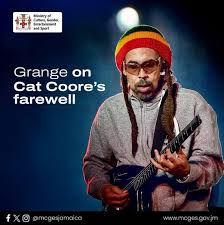The Changing of the Reggae Music Guards: Evolution Over Nostalgia
- Yaawd Media

- May 14, 2025
- 4 min read

The Birth of Reggae
It was the middle of the 1968 and Jamaican musicians and songwriters were continuing their experimentation within the local studios, adding varying dimensions to the musical stylings of the period. The Rock Steady period was at its height restyling American Rhythm & Blues sides driven by horns, drums and the electronic Fender bass guitars. The mounting experiments with the sound was significant as it brought about a kind of freedom for all concerned and represented a direct ownership of creativity. It was this creativity which birthed Reggae music, born in Jamaica in the middle of 1968.
While there has been scores of attempts to nail down ownership of the name Reggae and who created it, one thing that is beyond dispute is that Bunny Lee invited Stranger Cole into a recording session at Duke Reid’s Treasure Isle Recording studio where Lee was involved in a recording session with former Skatellites Saxophone player Lester Sterling and Reid’s studio band. On Bunny Lee’s invitation, Cole added the lyrics of “Woman no want Bangarang” to the instrumentals and the first Reggae song was born. The beat was much livelier than its predecessor Rock Steady, and was anchored by the drum and bass but with less horns. The free-wielding nature of the new sound not only inspired musicians but equally inspired song-writers to turn their own experiences into lyrics. It was this development more than anything else that gave the new Reggae sound its power.
Reggae: More than a Genre- A Cultural Force
Reggae has always been more than just a genre; it was a music that originated from the streets, a record of the people’s experiences. It became a cultural force, a voice of resistance, and a reflection of societal shifts. In its hey-day the music was driven by the voices of Max Romeo, Junior Byles, The Galdiators, John Holt, Horace Andy, Bob Marley & the Wailers, Burning Spear, Joseph Hill & Culture, Gregory Isaacs, Cocoa Tea and others. The reality though is that the one constant in the lives of all of us is “Change.” It was this change factor that moved Jamaica’s music from Mento to Ska and then to Rock-Steady, which eventually gave way to Reggae. In this regard, as with all art-forms, Reggae must evolve or risk stagnation. The Reggae Revival movement, often misunderstood as a return to classic roots reggae, was never meant to be a permanent revival of the past. Instead, it was a moment; a reawakening of consciousness in a new generation. Today, as the music industry and global culture continue to transform, the rigid expectations of what reggae "should" sound like are being challenged. The changing of the reggae guards is not a betrayal of tradition but a necessary evolution in a world that no longer resembles the era of Bob Marley, Peter Tosh, Max Romeo and Dennis Brown.
The Reggae Revival: A Movement, Not a Genre
In the early 2010s, a new crop of artistes were coming into their own including the likes of Chronixx, Protoje, and Kabaka Pyramid, artistes and musicians who infused classic roots reggae with contemporary influences. Taken together as a collective, these artistes were credited with bringing about the Reggae Revival of the early movement. While some fans and critics hailed this as a return to "real reggae," the movement was never intended to be considered a genre and never was. Also, the Reggae Revival movement was never about replicating the past. Instead, it was about reinterpreting reggae’s messages for a new generation. The Revival’s emphasis on lyrical depth, spirituality, and social justice echoed the golden age of reggae, but its sound was undeniably modern. Those who expected the Revival to permanently restore 1970s-style reggae misunderstood its purpose. Music, like all culture, is dynamic, as it would be ludicrous to believe that what resonated 50 years ago could remain unchanged in a world shaped by globalization, digital media, and new social struggles.
The Nostalgia Trap and the European Influence
It has become fashionable for so many who claim themselves as lovers of Reggae Music to persistently make demands for reggae to "return to its roots." This cry has been most persistently heard in Europe, where traditional reggae festivals have long celebrated the sounds of classic Jamaican music. European audiences, often removed from Jamaica’s contemporary realities, sometimes treat reggae as a relic to be preserved rather than a living, evolving art form. This nostalgia-driven mindset ignores the fact that modern Jamaican artists, all raised in a different time, cannot and should not be expected to mimic their grandparents’ music. This insistence on rigid authenticity risks turning reggae into a museum piece rather than a vibrant, evolving genre.
The Decline of Traditional Festivals and the Rise of New Sounds
Again, the one constant in the lives of us all is ‘change,” and as tastes shift, we see its impact on how Reggae festivals are held. Many traditional reggae festivals; particularly those resistant to innovation, are fading. Some critics sees this as a death knell for Reggae instead of as the natural transition that it really is. My view is that new festivals will always be emerging, blending Reggae with Dancehall, Afro-beats, Hip-hop, and Electronic Dance Music. The consequence is that some long-standing events will adapt and survive by embracing change, while others that choose to cling to an outdated formula, will disappear. This cycle is not unique to Reggae, as it is the fate of all musical genres that refuses to evolve.



Comments